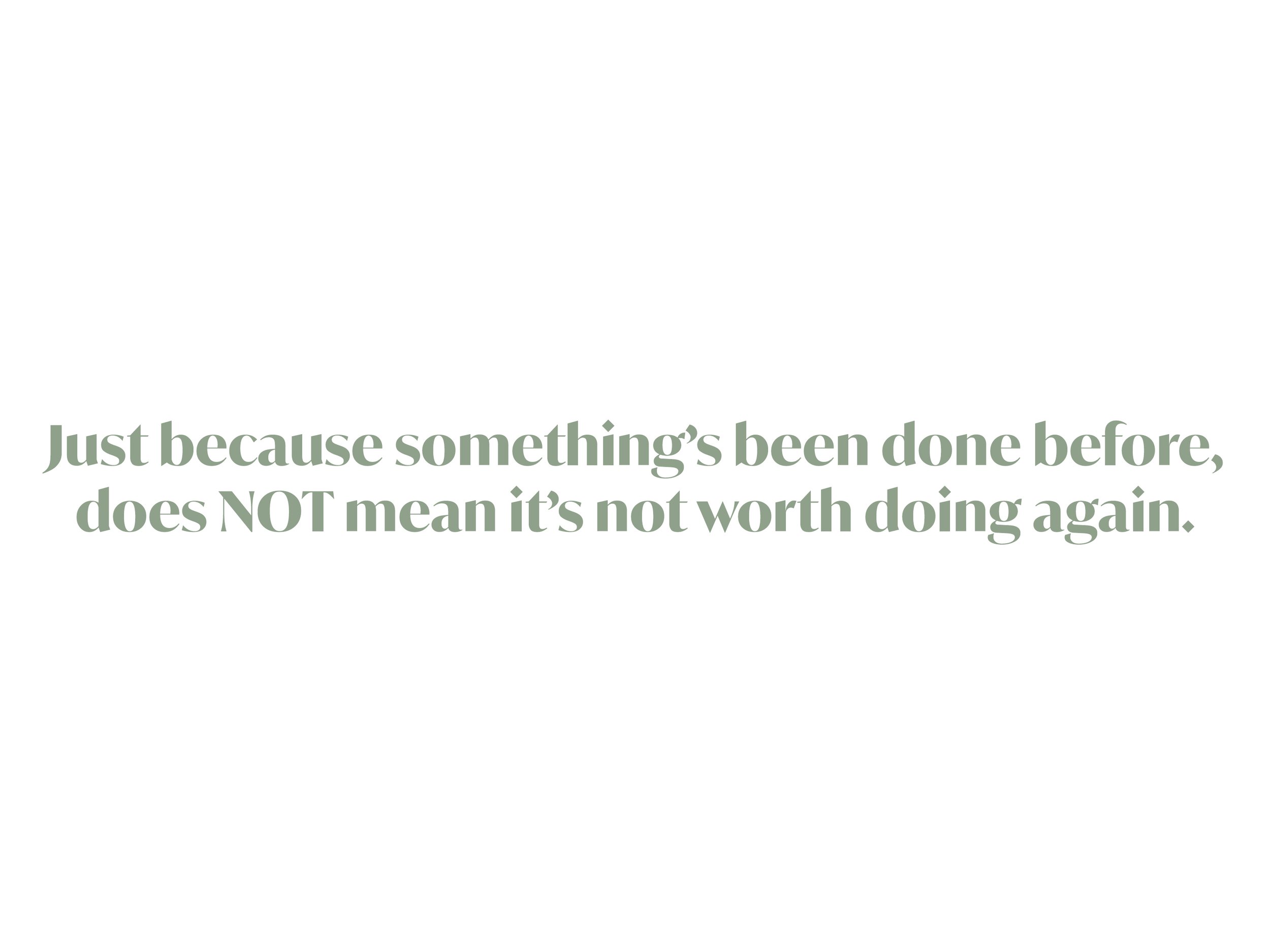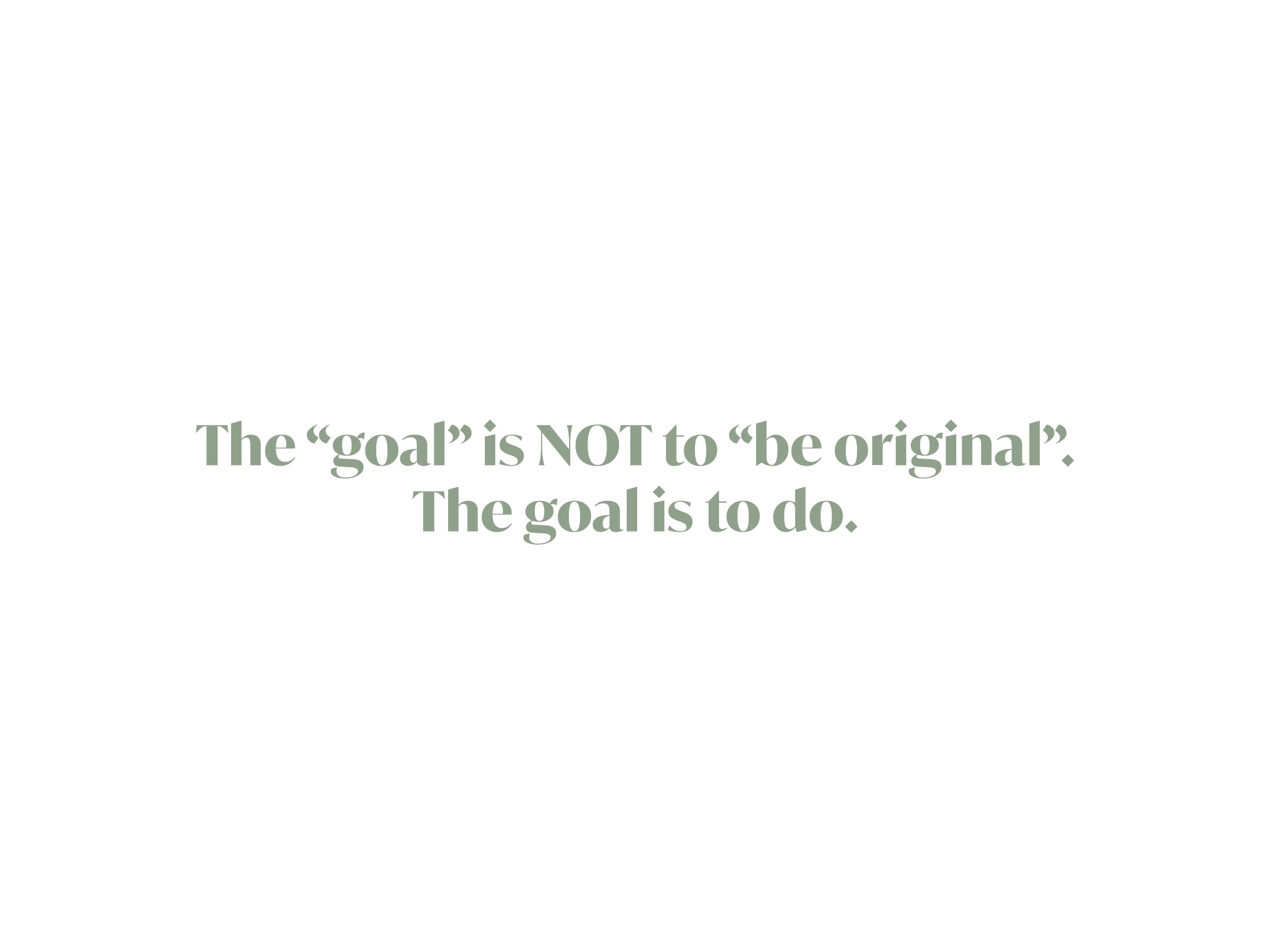Stop Trying to “Be Original” and Begin Creating
Today we’re going to talk about what I think is the most useless creative advice.
It’s going to be a bit of a rant because the night before I was getting a little heated on the topic. So, I’ll do my best to articulate these thoughts and we’ll see how far we get.
One of the most common creative advices given is to “be original”, “be unique”, or “be more creative”. And I just think it’s terrible advice. It’s useless because it doesn’t do much to help, and is pretty much just stating the obvious.
It’s also not a trope against constructive criticism because there really isn’t anything “constructive” about it. Personally, I prefer things that allow me to actually grow, change, and learn as opposed to stating the obvious. But the advice to “be original'“ carries none of that.
So, I’m not trying to offend anyone if this advice has helped you before. If it has, that’s great, continue to use it. But this whole concept is something I think is based on a central principal that has turned out (for me) to be a large creative limiter.
And that is this concept:
“Just because something’s been done before does NOT mean it’s not worth doing again.”
I think the common narrative is that people think things aren’t worth doing again, simply because they’ve been done already. Which is silly.
What all this “be original” advice is really saying is to just “be more creative”.
Great. Like how does one even judge that metric?
In other words, you’re just telling us to “be better”. Talk about unconstructive.
So anyways, here’s why I stopped trying to “be original” and instead began creating - for the sake of creating.
Absolutely yes, copy other people
Being original is a futile effort.
If we think about art’s long history, pretty much everything has probably been done before.
So if you’re trying to be more creative and do something new, newsflash: its probably been done before. And so, trying to be original is not only futile but it grabs our attention and has us focused on the wrong things.
This is why I recommend that we should absolutely copy from others (to learn, and not to steal).
Copying is how humans learn. Babies for example shout out many more phonetics than used in one’s native language. Over time however, they distill their speech to only a few that we respond to the most. Or else how would a baby say “mama” or “dada” in different languages? Does an American baby know it’s American? So it is completely natural to copy others - its how we learn.
By not copying others you’re actually limiting yourself from learning from everyone that came before. It’s hubris or a fallacy of some sort to not want to copy others. People find it “disingenuous” or stealing to do something “unoriginal” - but really, what are you going to gain from this? If we want to improve we must learn. If we want to learn we must “copy”. Think of them like art studies, not copying (since the word itself seems to leave a bad taste on the tongue). Imagine Davinci or Picasso doing something - absolutely you’d want to learn from them because they did what works. Copy from others to learn and don’t feel bad about it.
2. You Don’t Need to Reinvent the Wheel
This idea of trying to do everything by oneself is an inherent creative limiter. I don’t know where it stems from, but it’s made my own journey difficult in the past. Because we’re artists, there’s an aspect of us that thinks we’re unique, special, and have some one of a kind vision for the world (not everyone, of course). And…you probably are, but again, newsflash: it’s probably been done before.
So instead of trying to figure out “what hasn’t been done before” we should instead seek to explore the things that have been done before. It’s much easier to think of things that have been done as opposed to vice-versa, after all.
Because, imagine spending years and years developing some idea or technique, trying to be new and original only to find out its been done before. And even if you are first, chances are there are others working on the same thing as you somewhere else (think Tesla and Edison).
This is problem that comes up when the focus is on “being original”.
So maybe “being original” isn’t necessarily the problem. The problem is when we make being original the focus or goal.
3. The Goal is NOT to be Original - the Goal is to Do
So if the problem is that we have the wrong focus/goal, what do we actually focus on?
In my opinion, the goal is not to be original - the goal is to “create” or “do”.
It may seem a bit altruistic in art terms but it’s just a different way of saying “focus on the process”. I think it’s important to make art and create art for art’s sake no matter how original, no matter how new it is, no matter how redundant it is.
Express what you want - that’s the point.
When you try to be original you’re instead conforming to another group of individuals who ironically think they’re being “different”. To truly express and create freely means you can do and create whatever you want no matter if it’s been done before. And that shift in mindset has allowed me to break that creative limiter placed by many before me. F*ck trying to be original. Who cares if it’s been done before? Who cares if it’s good or bad? I’ll make whatever I want to make for the sake of making it - that makes me much more happy and fulfilled and allows me to truly create, unfiltered.
2.5 Trying to Be New Can Prevent Us From Starting in the First Place
A bit of a tangent, this is kind of a “point 2.5” in this discussion.
A lot of what I see young artists do, especially when they get this creative “advice” is: they’ll see other artists doing cool stuff. They’ll say to themselves: I wanna do something like that but I don’t want to do exactly what they do because then I’m just copying them.
This inherently forces us to try and think about stuff that “hasn’t been done before”, so much to the point where we end up not doing anything at all. We find ourselves in a state of paralysis of sorts.
And it’s understandable. A lot of people secretly wants some sort of mark on the world to validate their work and their time and effort. It makes sense. However this is a distraction from creating for the sake of creating.
Let go of this notion to create with expectation and learn to create freely - and not for the sake of anything else. That’s the gold standard I’m trying to reach with my own photography and art. It’s a difficult balance but I’m trying to subtract myself from not only the external validation of the world but this my own weird internal validation that I seek. What I try to do now is to: recognize it exists and remind myself as often as possible of this fact whenever I find myself creating for some external’s sake or false belief.
Because, at the end of the day, making something is better than nothing.
And remember:
“Just because something has been done before does NOT mean it’s not worth doing again.”




